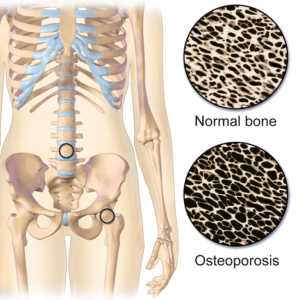
If you are 1 in 2 women or 1 in 4 men over the age of 50, your life is affected by osteoporosis. But what really is osteoporosis, and what effects might it have on your life?
Osteoporosis literally means “porous bone”
It is typically the result of poor bone formation and or excessive bone loss, which eventually leads to a decrease in bone density. Factors that affect your bone density include age, hormone levels, activity status, and diet. However age tends to be the overarching culprit for the changes, as the other three factors often change along with age.
For example, sex hormones decrease in both females and males as we age. For females, menopause greatly decreases estrogen output, and for males, testosterone begins a gradual downward slope beginning around age 30. Bone density is negatively impacted as both of these hormones decrease. Yet, although everyone does experience a decrease in their sex hormones over time, other factors such as activity status and diet can help offset those effects.
Physical activity and forms of exercise are well known methods to maintain or improve bone density as you age. Wolff’s Law, developed in the 19th century by Julius Wolff, explains this idea perfectly, “bone function changes cause bone structure modification.” This means that, to a point, our bodies adapt to increased loads, such as increasing our bone density as we begin lifting weights, dancing, or running. However, just like everything, too much exercise or physical activity can result in an increased risk of injury or an increased production of the stress hormone cortisone, which decreases bone density when made it too great amounts or for extended periods of time.
Diet also plays a critical role in fending off osteoporosis
Most of us probably grew up being told to drink milk to keep our bones strong. To a point this is true because milk contains calcium, which is a key contributor to improving bone formation. Yet, while calcium is important, maintaining a calorically and nutritionally rich diet may be just as, or more, important. This is why eating disorders are HUGE contributors to poor bone health. Not only do eating disorders greatly decrease the consumption of calories, once again activating the release of cortisone, but they also decrease the essential nutrients needed to build more bone and limit bone degradation. Eating a nutritionally and calorically dense diet is a sure way to maintain good bone health.
Osteoporosis is affecting more lives than ever
In fact, in a report for the US Surgeon General in 2004, the number of hip fractures, due in large part to osteoporosis, is expected to double or triple in frequency by the year 2020. With so many people being affected by osteoporosis, you probably know of someone who has broken their hip and the difficult return they have taken to regain their normal lives. Maybe you even know someone who has been taken care of by one of our surgeons at Washington Orthopaedic Center for a hip fracture. As a family centered clinic, we strive to bring our patients the best personalized and quality of care available. We sincerely wish you the best of health, but if anything should happen please be aware that we are here to help. Give us a call at 360-736-2889 to schedule an appointment with us today!
-Article by Levi Bale

